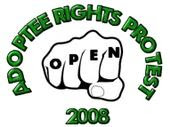 CHICAGO TRIBUNE
CHICAGO TRIBUNEMarch 21, 2008
Editorial: Adoptees and Their Records
A decade ago, a bid to open many adoption-related records for adult adoptees in Illinois failed in the General Assembly. Bombarded by fierce opposition from bar groups and adoption agencies, lawmakers backed off. In effect, they respected the wishes of birth parents who had been granted anonymity when they placed children for adoption.
Now there's a new effort to open one type of record for people who have been adopted.
State Rep. Sara Feigenholtz (D-Chicago) has introduced a bill that would allow adults who were adopted to obtain copies of their original birth certificates. The bill would allow adoptees who were born before Jan. 1, 1946, to get copies of their original birth certificates when the proposed law takes effect. Those born after that date would have to wait until April 1, 2009. That lag period would give each birth parent a chance to file an official document asking to keep his or her identity confidential.
At the moment, adoptees can't get their original birth certificates, which typically bear birth parents' names. When a child is adopted, an amended birth certificate is created, with the adoptive parents' names only.
Since the 1980s, more adoptions have moved toward openness—an ongoing relationship between a child and his or her birth parents, or at least an exchange of information as a child grows. That's a personal choice for biological and adoptive parents to arrange. Adoption agencies typically help them decide what their mutual degree of openness will be.
Parents who relinquish a baby to adoption and choose not to maintain contact essentially strike an agreement with the state and with the adoption agency. The agency and the state say they will honor the birth parents' privacy; the records are sealed.
This bill would break that agreement.
Many adoptees argue that they're the only Americans routinely denied such basic and vital information as their birth certificates. They say they often can't get family health histories. They know nothing about their ancestors.
If there were no other way for an adoptee to get such information, we'd be inclined to support this bill. But there are other ways. Illinois has set out a reasonable path that this page supports for adoptees to find biological parents or other relatives, if those blood relatives want—or with prompting, if they agree—to be found.
First, there's a state registry where adoptees and birth relatives can sign up to find each other. It's run by the Illinois Department of Public Health. As of last December, there were 10,034 people registered, including 6,719 adoptees and 2,391 birth mothers and 366 birth fathers, according to a department spokeswoman. The registry has tallied 618 matches since its inception in 1985.
A second program allows an adoptee to ask a court to appoint a confidential intermediary to try to make contact. These intermediaries are granted access to sealed court records to help them find birth parents or other relatives. Their track record is impressive. They locate a birth parent or other relative about 90 percent of the time.
But here's something to remember: Only about half the time do the birth parents or relatives consent to some contact. Some of that contact is anonymous, with birth parents and adoptees exchanging letters without identifying information. Some of the contact is more open, leading to meetings.
Deciding that original birth certificates should suddenly be open would be a reason for many adoptees to celebrate. But it also would raise the possibility that some birth parents could get an unexpected and unwanted phone call or knock on the door.
Under the proposed law, there would be a six-month general information campaign to let everyone know about the changes in the law. That would allow birth parents a chance to file the official requests to keep their identities private.
In effect, the legislation would shift responsibility for maintaining anonymity from the state to birth parents.
But that hardly guarantees birth parents will hear about the change in law; some will have moved out of state.
If those parents didn't hear about their new responsibility and react, the proposed law would presume their consent to release the birth certificate.
The possibility of a birth parent getting blindsided tips the balance against this bill.
Link to article








No comments:
Post a Comment